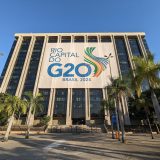Universal access to health will only be possible and sustainable if innovation is a key driver
Universal access to health will only be possible and sustainable if innovation is a key driver
Pasquale Frega - President Novartis LACan Region (Canada and Latin America)
In the last decade, the healthcare sector has undergone a constant transformation, driven mainly by the integration of the new technologies available and the growing commitment to put patients at the heart of the conversation. These drivers are aimed at meeting the third goal of the United Nations (UN) in terms of sustainable development: universal access to health.
One of the great health challenges currently facing the Latin American and Caribbean region is to change the idea that guaranteeing health for all is simply an expense, when in fact it is an investment focused on ensuring that people fully enjoy the right to have the health services they need available to them when they need them.
This region faces particular challenges, one of them being cardiovascular diseases, which are one of the leading causes of death in men and women, as figures reveal that they are responsible for around 2 million human losses annually. This can be aggravated when there are not equal opportunities to access health services, leading to delays in diagnosis and treatment.
INVESTING IN HEALTH IS INVESTING IN LIFE
Investment in health is a commitment to the present and the future of the region, a way of guaranteeing a better quality of life and greater equity for all. This has gone hand in hand with a long history of health reforms based on principles of solidarity and collective work to overcome inequality gaps in terms of universal access to health.
These reforms have created instances, mechanisms, and initiatives for coordination and dialogue between all actors in the health ecosystem, for example, PAHO PRAIS - Regional Platform for Access and Innovation of Health Technologies, IDB - Regional Public Goods. However, one of the great challenges faced when talking about Universal Health Coverage is financial sustainability, which implies heavy financial pressure on governments. In this regard, the Economic Commission for Latin America and the Caribbean (ECLAC) estimates that public spending on health in the region corresponds to 3.8% of GDP, far from the World Health Organisation's (WHO) recommendation of 6% of GDP, which undoubtedly represents a significant challenge in achieving universal, dignified and equal access to health.
INNOVATION IN HIGH-IMPACT PROJECTS
El valor de la innovación en proyectos que vayan en beneficio de la salud de la sociedad es indiscutible. Impulsar nuevos productos farmacéuticos y tecnológicos, pensados específicamente para las necesidades de la región de América Latina y el Caribe es una garantía, no sólo del inmediato mejoramiento de la calidad de vida, sino para salvar millones de vidas. Como dijo una vez Bill Gates: “Si nuestro objetivo es salvar vidas humanas, necesitamos otro nivel de innovación, no sólo tecnológica, sino también sistémica”.
It is essential to promote concrete projects for specific diseases that afflict the region. An example of this is breast cancer, which has a prevalence of 213.7 per 100,000 people, meaning that nearly 6 million people in the region suffer from it, mainly women. It is worth noting that medical and pharmaceutical innovations have significantly improved the life prognosis, survival rates, and quality of life of thousands of breast cancer patients.
However, the impact on society and people's lives cannot be measured solely in terms of clinical outcomes. For example, a woman who, in addition to receiving early diagnosis and timely treatment of breast cancer, must also obtain other types of care for needs that are not only in the sense of the patient's physical health, providing comprehensive care at the different levels of people's lives by providing support and attention to the mental health of the patient and her family.
Although today there are many challenges to overcome to achieve universal health care in Latin America and the Caribbean, one that is dignified, according to the needs of the population, the efforts in the world of medicine do not cease, in a hasty and permanent way, and innovation in medicines and therapies has grown at an unprecedented rate, especially after the COVID 19 pandemic. Currently, there are more than 9,000 new medicines and vaccines in the development phase. I believe that there is still a long way to go, but, through systemic innovation and collaboration with public and private entities, I am confident that we will soon find solutions that will allow us to build a healthcare legacy for the future.


